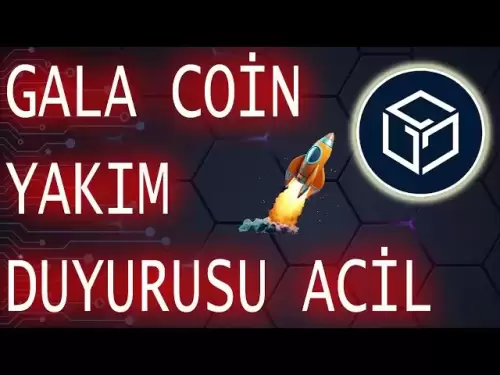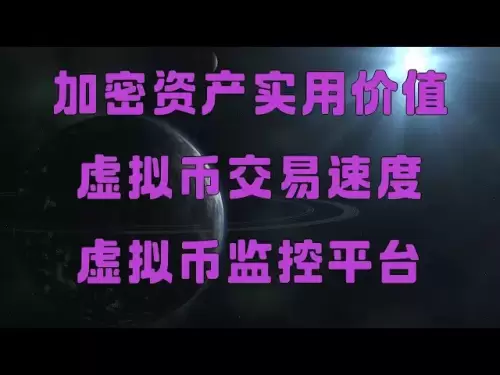-
 Bitcoin
Bitcoin $105,734.0170
-1.51% -
 Ethereum
Ethereum $2,414.7328
-3.26% -
 Tether USDt
Tether USDt $1.0002
0.00% -
 XRP
XRP $2.1748
-2.62% -
 BNB
BNB $647.5663
-1.72% -
 Solana
Solana $148.1710
-3.81% -
 USDC
USDC $0.9999
-0.01% -
 TRON
TRON $0.2799
-0.02% -
 Dogecoin
Dogecoin $0.1586
-4.17% -
 Cardano
Cardano $0.5440
-5.03% -
 Hyperliquid
Hyperliquid $37.0680
-6.59% -
 Bitcoin Cash
Bitcoin Cash $501.2052
-4.01% -
 Sui
Sui $2.6846
-3.47% -
 Chainlink
Chainlink $12.8488
-3.38% -
 UNUS SED LEO
UNUS SED LEO $8.9480
-1.51% -
 Avalanche
Avalanche $17.2059
-3.87% -
 Stellar
Stellar $0.2270
-4.75% -
 Toncoin
Toncoin $2.7889
-3.93% -
 Shiba Inu
Shiba Inu $0.0...01126
-1.76% -
 Litecoin
Litecoin $83.6893
-3.36% -
 Hedera
Hedera $0.1445
-4.49% -
 Monero
Monero $312.4014
-2.58% -
 Dai
Dai $1.0000
0.00% -
 Ethena USDe
Ethena USDe $1.0001
-0.01% -
 Polkadot
Polkadot $3.2920
-3.32% -
 Bitget Token
Bitget Token $4.4629
-1.81% -
 Uniswap
Uniswap $6.5386
-8.42% -
 Aave
Aave $260.3780
-6.01% -
 Pepe
Pepe $0.0...09308
-4.54% -
 Pi
Pi $0.4864
-3.04%
Does the Exodus wallet support batch transfers?
Exodus wallet does not support batch transfers, requiring users to send individual transactions, but alternatives like Electrum and manual batching exist.
Apr 06, 2025 at 10:22 pm
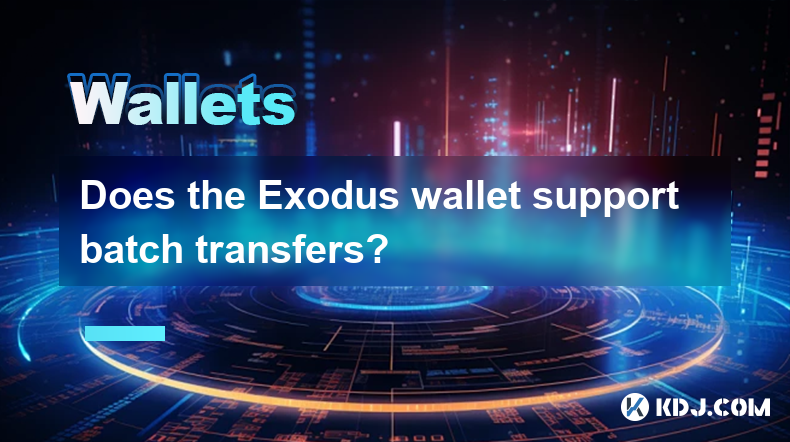
The Exodus wallet is a popular choice among cryptocurrency enthusiasts due to its user-friendly interface and support for a wide range of cryptocurrencies. One of the features that users often inquire about is the ability to perform batch transfers. In this article, we will explore whether the Exodus wallet supports batch transfers and provide detailed insights into how this functionality works within the wallet.
Understanding Batch Transfers
Batch transfers refer to the ability to send multiple transactions in a single operation. This feature is particularly useful for users who need to send cryptocurrencies to multiple recipients simultaneously. It can save time and reduce the complexity of managing individual transactions. In the context of cryptocurrency wallets, batch transfers can be a significant advantage for users who frequently engage in multiple transactions.
Exodus Wallet Overview
Exodus is a multi-currency wallet that supports over 100 different cryptocurrencies, including Bitcoin, Ethereum, and many others. It is known for its sleek design and ease of use, making it accessible to both beginners and experienced users. The wallet offers features such as built-in exchange services, portfolio tracking, and the ability to manage private keys securely. However, the question remains whether it supports batch transfers.
Does Exodus Wallet Support Batch Transfers?
As of the latest updates, the Exodus wallet does not support batch transfers. This means that users cannot send multiple transactions to different recipients in a single operation. Instead, users must initiate individual transactions for each recipient. While this may be a limitation for some users, it is important to understand the reasons behind this design choice and explore alternative solutions.
Reasons for Not Supporting Batch Transfers
There are several reasons why the Exodus wallet might not support batch transfers. One primary reason is the complexity involved in managing multiple transactions securely. Batch transfers require sophisticated handling of transaction data, which can increase the risk of errors or security vulnerabilities. Additionally, the user interface would need to be redesigned to accommodate batch transfer functionality, which could compromise the wallet's simplicity and user-friendliness.
Alternative Solutions for Batch Transfers
While the Exodus wallet does not support batch transfers, there are alternative solutions that users can consider. Here are some options:
- Using a different wallet: Some cryptocurrency wallets, such as Electrum for Bitcoin, do support batch transfers. Users can explore these alternatives if batch transfers are a critical feature for their needs.
- Manual batching: Users can manually create multiple transactions and send them one after another. This method is time-consuming but can achieve the same result as batch transfers.
- Third-party services: There are third-party services and platforms that offer batch transfer capabilities. Users can transfer their cryptocurrencies to these platforms, perform the batch transfers, and then move the funds back to their Exodus wallet.
How to Perform Individual Transfers in Exodus Wallet
Since batch transfers are not supported, it is essential to understand how to perform individual transfers in the Exodus wallet. Here is a step-by-step guide:
- Open the Exodus wallet and navigate to the portfolio section.
- Select the cryptocurrency you wish to send.
- Click on the "Send" button.
- Enter the recipient's address and the amount you want to send.
- Review the transaction details and confirm the transaction.
- Wait for the transaction to be processed on the blockchain.
Security Considerations for Multiple Transactions
When performing multiple individual transactions, it is crucial to consider security aspects. Here are some tips to ensure the safety of your transactions:
- Double-check recipient addresses: Always verify the recipient's address before sending any cryptocurrency to avoid sending funds to the wrong address.
- Use strong passwords: Ensure that your Exodus wallet is protected with a strong, unique password.
- Enable two-factor authentication (2FA): If available, enable 2FA to add an extra layer of security to your wallet.
- Monitor transaction fees: Be aware of the transaction fees associated with each transfer, as they can add up when performing multiple transactions.
Future Possibilities for Batch Transfers in Exodus
While the Exodus wallet currently does not support batch transfers, it is possible that future updates could include this feature. The development team at Exodus regularly updates the wallet with new features and improvements based on user feedback. If there is significant demand for batch transfers, it could be a feature that is considered for future releases. Users interested in this functionality should keep an eye on Exodus's official announcements and updates.
User Feedback and Community Discussions
The Exodus community is active and often discusses features and improvements on various platforms, including social media and forums. Users can engage in these discussions to express their need for batch transfers and provide feedback to the development team. This community input can be valuable in shaping the future direction of the wallet and potentially leading to the inclusion of batch transfer functionality.
Comparing Exodus with Other Wallets
To better understand the position of Exodus regarding batch transfers, it is helpful to compare it with other cryptocurrency wallets. Here are some comparisons:
- Electrum: Electrum is a Bitcoin wallet that supports batch transfers. It is more focused on advanced users and offers a range of features tailored to their needs.
- MyEtherWallet (MEW): MEW is an Ethereum wallet that also supports batch transfers. It is known for its flexibility and is popular among Ethereum users.
- Ledger Live: Ledger Live, the software for Ledger hardware wallets, does not support batch transfers but offers robust security features and a user-friendly interface.
Impact of Batch Transfers on User Experience
The absence of batch transfers in the Exodus wallet can impact the user experience, particularly for users who frequently need to send multiple transactions. Here are some ways this can affect users:
- Time efficiency: Without batch transfers, users must spend more time initiating and confirming individual transactions, which can be time-consuming.
- Transaction fees: Multiple individual transactions can result in higher cumulative transaction fees compared to a single batch transfer.
- Error risk: Managing multiple transactions individually increases the risk of errors, such as sending funds to the wrong address or entering incorrect amounts.
Exploring the Technical Aspects of Batch Transfers
To understand why batch transfers are not supported in the Exodus wallet, it is helpful to delve into the technical aspects. Batch transfers require the wallet to handle multiple transaction inputs and outputs in a single operation. This involves:
- Transaction data management: The wallet must manage and organize the data for multiple transactions, ensuring that each transaction is correctly formatted and signed.
- Blockchain compatibility: The wallet must ensure that the batch transfer is compatible with the underlying blockchain's protocol, which can vary between different cryptocurrencies.
- User interface design: The user interface must be designed to allow users to input multiple recipients and amounts easily, which can be challenging to implement without compromising usability.
User Workarounds for Batch Transfers
Despite the lack of native batch transfer support in the Exodus wallet, users have developed various workarounds to achieve similar results. Here are some common strategies:
- Using scripts: Some users create scripts to automate the process of sending multiple transactions. These scripts can be run outside the wallet to generate and send transactions.
- CSV import: Some wallets allow users to import a CSV file containing multiple transaction details. While Exodus does not support this, users can use other wallets that do and then transfer the funds back to Exodus.
- Manual batching with notes: Users can manually create a list of recipients and amounts, then systematically send each transaction while keeping track of their progress.
Exodus Wallet's Focus on User Experience
Exodus wallet's primary focus is on providing a seamless and user-friendly experience. The decision to not include batch transfers may be part of this focus, as adding such a feature could complicate the interface and potentially deter new users. The wallet's design philosophy emphasizes simplicity and ease of use, which is evident in its clean interface and straightforward navigation. While this may limit some advanced features, it ensures that the wallet remains accessible to a broad audience.
Community Support and Resources
The Exodus community offers various resources and support channels for users. These include:
- Official support: Exodus provides official support through its website, where users can find FAQs, guides, and contact options for further assistance.
- Community forums: There are active community forums where users can discuss features, share tips, and seek help from other users.
- Social media: Exodus maintains a presence on social media platforms, where users can stay updated on new features and engage with the community.
Future Developments and User Expectations
As the cryptocurrency space continues to evolve, user expectations for wallet features also change. The demand for batch transfers may grow, prompting wallet developers to reconsider their feature sets. Exodus, like other wallets, will need to balance the addition of new features with maintaining its core user experience. Users should stay informed about updates and provide feedback to help shape the future of the wallet.
Common Questions Related to Exodus Wallet and Batch Transfers
Q: Does the Exodus wallet support batch transfers?
A: No, the Exodus wallet does not currently support batch transfers. Users must initiate individual transactions for each recipient.
Q: Why doesn't the Exodus wallet support batch transfers?
A: The primary reasons include the complexity of managing multiple transactions securely and maintaining a user-friendly interface. Batch transfers could introduce additional risks and complicate the user experience.
Q: Are there any workarounds for batch transfers in the Exodus wallet?
A: Yes, users can manually create multiple transactions, use third-party services that support batch transfers, or consider using a different wallet that offers this feature.
Q: Can I expect batch transfers to be added to the Exodus wallet in the future?
A: While there are no current plans to add batch transfers, future updates could include this feature based on user demand and feedback. Users should stay updated through official channels.
Q: What are the security considerations when performing multiple individual transactions in the Exodus wallet?
A: Users should double-check recipient addresses, use strong passwords, enable two-factor authentication if available, and monitor transaction fees to ensure the security of their transactions.
Q: How can I perform individual transfers in the Exodus wallet?
A: To perform an individual transfer, open the Exodus wallet, select the cryptocurrency you wish to send, click on the "Send" button, enter the recipient's address and amount, review the transaction details, and confirm the transaction.
Q: Are there other wallets that support batch transfers?
A: Yes, wallets like Electrum for Bitcoin and MyEtherWallet (MEW) for Ethereum support batch transfers. Users can explore these alternatives if batch transfers are essential for their needs.
Disclaimer:info@kdj.com
The information provided is not trading advice. kdj.com does not assume any responsibility for any investments made based on the information provided in this article. Cryptocurrencies are highly volatile and it is highly recommended that you invest with caution after thorough research!
If you believe that the content used on this website infringes your copyright, please contact us immediately (info@kdj.com) and we will delete it promptly.
- Crypto Trends 2025: MAGACOIN FINANCE Surges, Ethereum Mining Evolves, and XRP Payouts Innovate
- 2025-07-02 10:30:12
- Ethereum, MAGACOIN FINANCE, and Inflation: A Shift in Crypto Investor Focus
- 2025-07-02 10:30:12
- Kangaroos, Coin Purses, and a Hop Through Money History: You Gotta See This!
- 2025-07-02 10:50:15
- Arbitrum, Robinhood, and ARB Price: Is a Rebound on the Horizon?
- 2025-07-02 10:50:15
- Cryptos in 2025: Early Backers Cash In?
- 2025-07-02 10:55:17
- Lightchain AI: Bonus Round Buzz and Mainnet Activation on the Horizon
- 2025-07-02 11:10:12
Related knowledge
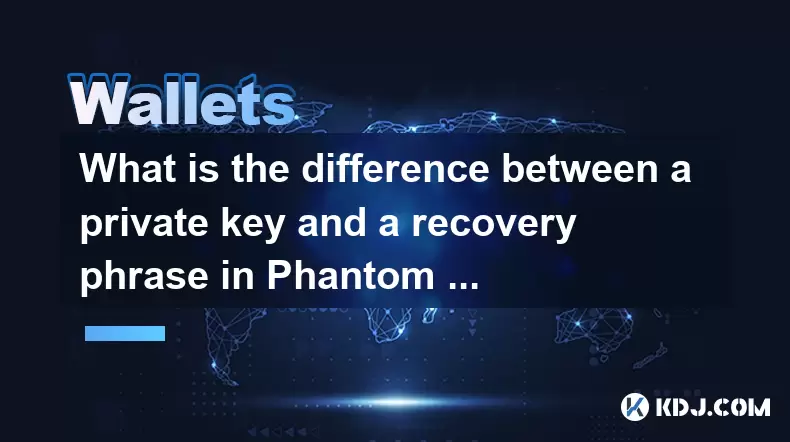
What is the difference between a private key and a recovery phrase in Phantom wallet?
Jul 02,2025 at 09:57am
Understanding the Basics of Phantom WalletPhantom wallet is a non-custodial digital wallet primarily used for interacting with the Solana blockchain. It allows users to store, send, and receive SOL tokens and other digital assets like NFTs. Non-custodial means that the user retains full control over their private keys and recovery phrases. Understanding...
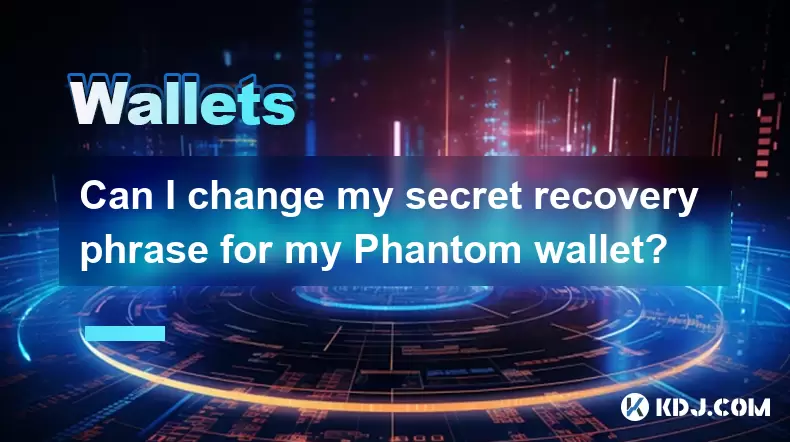
Can I change my secret recovery phrase for my Phantom wallet?
Jul 02,2025 at 12:07pm
Understanding the Role of a Secret Recovery PhraseThe secret recovery phrase, often referred to as a seed phrase, is a critical component in managing cryptocurrency wallets like Phantom. It serves as a backup mechanism that allows users to recover their wallet and associated assets if they lose access to their device or password. Typically, this phrase ...
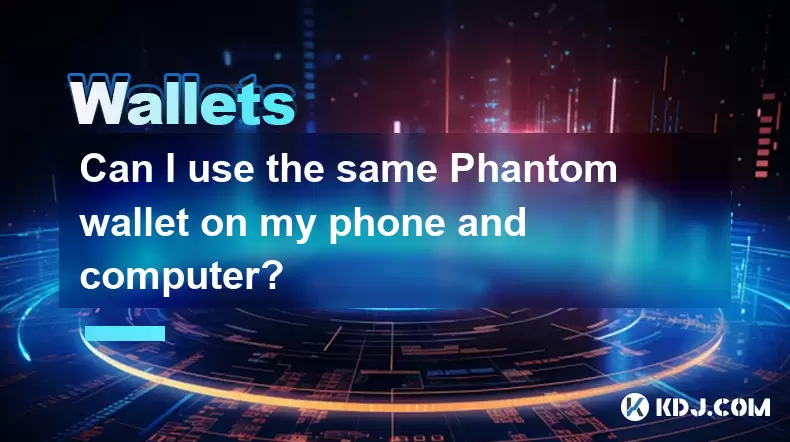
Can I use the same Phantom wallet on my phone and computer?
Jul 02,2025 at 10:04am
Phantom Wallet: Cross-Device CompatibilityPhantom wallet is a non-custodial cryptocurrency wallet designed primarily for interacting with the Solana blockchain. It supports both browser extensions and mobile applications, making it versatile for users who want to manage their digital assets across multiple devices. One of the most common questions among...
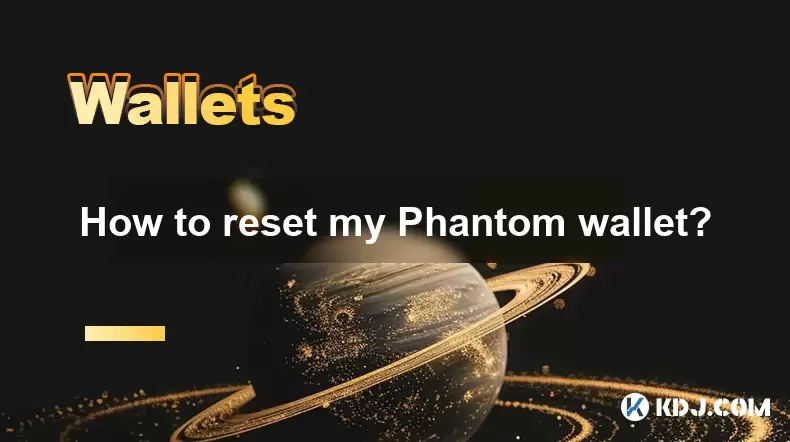
How to reset my Phantom wallet?
Jul 02,2025 at 12:36am
Understanding the Need for Resetting Your Phantom WalletIf you're using a Phantom wallet, you may encounter situations where resetting your wallet becomes necessary. This could be due to forgotten passwords, seed phrase issues, or account corruption. Phantom is a non-custodial wallet primarily used for interacting with the Solana blockchain, and it stor...
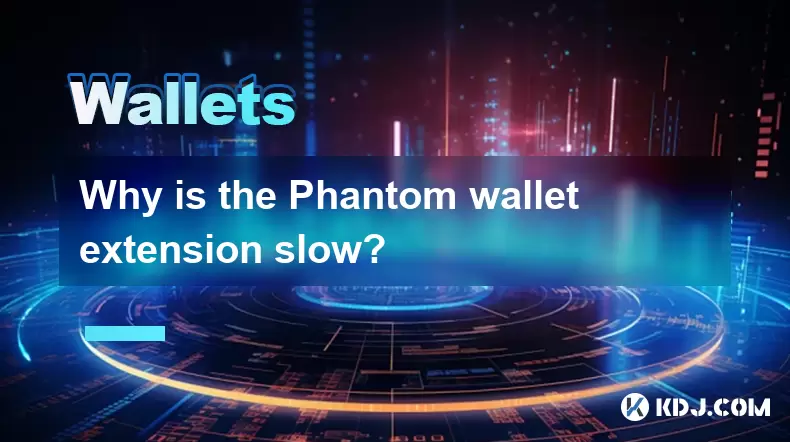
Why is the Phantom wallet extension slow?
Jul 02,2025 at 04:15am
Phantom Wallet Extension: Why Is It Slow?Phantom wallet is a widely used browser extension for interacting with decentralized applications (dApps) on the Solana blockchain. Despite its popularity, some users report that the Phantom wallet extension runs slowly at times. This article delves into potential reasons behind this performance issue and provide...
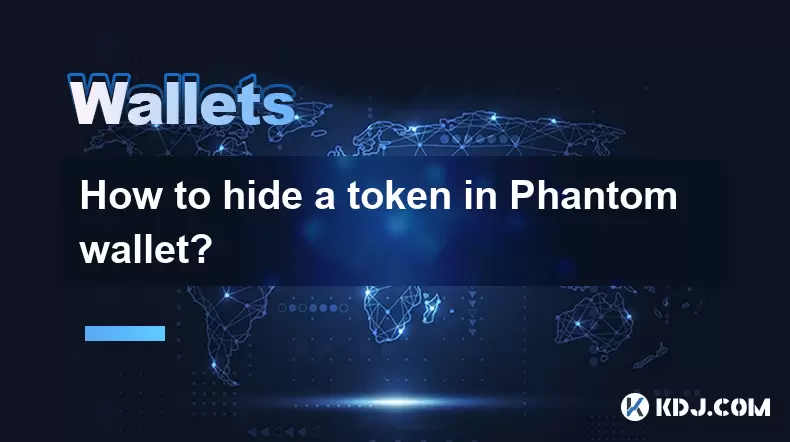
How to hide a token in Phantom wallet?
Jul 01,2025 at 05:49pm
Understanding the Phantom Wallet InterfacePhantom wallet is a popular non-custodial wallet used primarily for interacting with the Solana blockchain. It allows users to store, send, receive, and manage various tokens, including both fungible and non-fungible tokens (NFTs). Before attempting to hide a token, it's essential to understand how the wallet in...

What is the difference between a private key and a recovery phrase in Phantom wallet?
Jul 02,2025 at 09:57am
Understanding the Basics of Phantom WalletPhantom wallet is a non-custodial digital wallet primarily used for interacting with the Solana blockchain. It allows users to store, send, and receive SOL tokens and other digital assets like NFTs. Non-custodial means that the user retains full control over their private keys and recovery phrases. Understanding...

Can I change my secret recovery phrase for my Phantom wallet?
Jul 02,2025 at 12:07pm
Understanding the Role of a Secret Recovery PhraseThe secret recovery phrase, often referred to as a seed phrase, is a critical component in managing cryptocurrency wallets like Phantom. It serves as a backup mechanism that allows users to recover their wallet and associated assets if they lose access to their device or password. Typically, this phrase ...

Can I use the same Phantom wallet on my phone and computer?
Jul 02,2025 at 10:04am
Phantom Wallet: Cross-Device CompatibilityPhantom wallet is a non-custodial cryptocurrency wallet designed primarily for interacting with the Solana blockchain. It supports both browser extensions and mobile applications, making it versatile for users who want to manage their digital assets across multiple devices. One of the most common questions among...

How to reset my Phantom wallet?
Jul 02,2025 at 12:36am
Understanding the Need for Resetting Your Phantom WalletIf you're using a Phantom wallet, you may encounter situations where resetting your wallet becomes necessary. This could be due to forgotten passwords, seed phrase issues, or account corruption. Phantom is a non-custodial wallet primarily used for interacting with the Solana blockchain, and it stor...

Why is the Phantom wallet extension slow?
Jul 02,2025 at 04:15am
Phantom Wallet Extension: Why Is It Slow?Phantom wallet is a widely used browser extension for interacting with decentralized applications (dApps) on the Solana blockchain. Despite its popularity, some users report that the Phantom wallet extension runs slowly at times. This article delves into potential reasons behind this performance issue and provide...

How to hide a token in Phantom wallet?
Jul 01,2025 at 05:49pm
Understanding the Phantom Wallet InterfacePhantom wallet is a popular non-custodial wallet used primarily for interacting with the Solana blockchain. It allows users to store, send, receive, and manage various tokens, including both fungible and non-fungible tokens (NFTs). Before attempting to hide a token, it's essential to understand how the wallet in...
See all articles





















